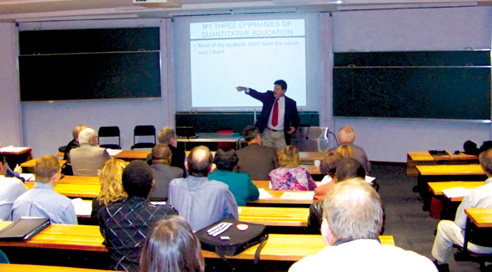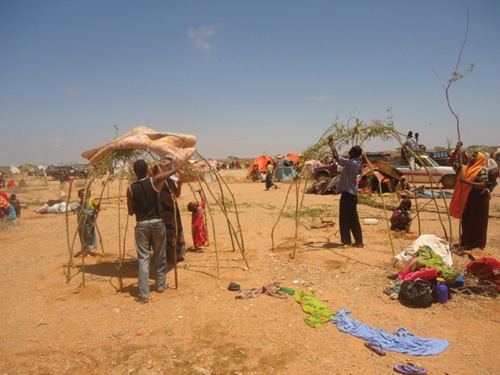How to Find and Prepare for Opportunities to Work in Developing Nations
James J. Cochran earned his bachelor’s and master’s degrees from Wright State University and his PhD from the University of Cincinnati. He has taught many undergraduate and graduate courses and published more than 20 papers in peer-reviewed journals. In 2008, he was awarded the INFORMS Prize for the Teaching of OR/MS Practice. He is the co-founder of Statistics Without Borders.
Working in a developing nation can be an extremely rewarding element of your professional life, and if your experience is anything like mine, the benefits will be plentiful and spill over into your private life. However, finding a suitable problem to which you can contribute your particular statistical expertise can be challenging.
I have been fortunate, I have been afforded and taken advantage of opportunities to work on every continent except Antarctica—and I have not given up hope on being invited to spend some time at McMurdo Station on Ross Island, Palmer Station on Anvers Island, or Amundsen-Scott at the South Pole! But not too many years ago, my professional experience was limited to the United States and Canada. My first opportunity to work outside North America arose as a result of my participation in a conference held by the European Operational Research Societies (EURO).
The EURO is a consistently strong conference relevant to my research, and the conference was held in Reykjavik, Iceland—a place I had always wanted to see. I scrounged up the funds (paid for most of the trip myself) and attended the conference. While there, I was able to meet people who I never would have met at a conference in the United States and learn about applications to problems from all over the world (even Antarctica!). I ultimately established collaborative relationships with a few of these individuals—relationships that have evolved into terrific friendships—and began working on projects in developing countries.
So my first suggestion is to attend a conference outside of the United States or Canada. If you have little or no idea where outside of the United States or Canada you would like to work, then you should consider attending an international conference with broad appeal such as the biennial World Statistics Congress of the International Statistical Institute (ISI) or the triennial conference of the International Federation of Operational Research Societies (IFORS). Such conferences will provide you with ample opportunity to meet colleagues from around the world who are working on research projects and applications that may be of interest to you.
If there is some part of the world where you know you would like to work, then you should try to attend a conference held by that country’s professional statistics association. You can find information about many of these conferences on the online event calendars maintained by the ASA and ISI. If no event in your target country is listed on either of these calendars, you can search the Internet and/or use the ISI’s membership directory to find names and contact information of the leaders of the country’s professional statistics association. A little determination will pay off, and the individuals you find will likely be happy to hear from you and share information about their organization’s activities.
If attending a conference on another continent is infeasible, you can contact colleagues at universities in your target country. Most major universities provide contact information for faculty members (this is, unfortunately, not as common across Africa as it is for other continents), and you can allow Google to translate if language is a barrier. Start slowly; do your homework and learn what you can about the research of the individual you are contacting. Then, share information about your experience, education, and research record/interests and discuss how they overlap with the individual(s) you are contacting. Conclude by expressing an interest in exploring a potential collaboration.
While these approaches will help you find academic colleagues outside the United States and Canada with whom you may wish to collaborate, many important problems on which you could work are outside the realm of academia. Nonprofit organizations (NPOs) and government agencies are vibrant sources of interesting problems for statisticians who are interested in working in developing nations. The ASA provides several ways you can contribute to problems faced by these groups. Statistics Without Borders (SWB) is an ASA outreach group dedicated to providing free statistical consulting to organizations and government agencies, particularly from developing nations that do not have the resources for statistical services. If you join SWB, you will receive periodic email detailing opportunities for SWB volunteers to contribute their statistical expertise to a variety of problems and issues around the world.
Another ASA outreach group, Friends of Australasia (FOA), focuses on fostering collaborative efforts between ASA members and colleagues in the South Pacific. For example, since 2011, FOA leaders under the direction of Mark Griffin have worked with Fijian colleagues to organize an annual statistics conference in Suva. FOA is open to all ASA members, and its leaders are always looking for new ways to strengthen the relationship between the ASA and our colleagues in Australasia.
Social networking offers incredible potential for your search for opportunities in developing nations. I have used LinkedIn to identify and establish professional relationships with several key individuals in NPOs. This has led to my participation in efforts in extremely remote places such as Mozambique, the Congo, and Somalia. When you see a news report on television, hear a news report on the radio, or read a news report in a newspaper (if you can find a newspaper) or on the Internet, do some digging to learn more and then think about how you could contribute your statistical expertise. Use social media to find someone involved and ask for more information. Once you have learned what you can about the problem or issue of interest, write a few paragraphs explaining how you might be able to contribute to the resolution of the problem or issue and send your brief ‘proposal’ to your contact. Of course, you should always be aware that well-qualified statisticians already may be working on the project or issue of interest and your assistance may not be needed.
Another way to contribute to a research project in a developing country is to serve on or chair a dissertation committee for a graduate student studying in that country. Many African nations suffer from a shortage of statistics and operations research academics who are qualified to serve on these committees, and by doing so, you can simultaneously help a graduate student complete requirements for her/his degree, build statistical/analytical capacity for that country, and satisfy your desire to work in a developing country. A program for identifying student needs and matching them with volunteer expertise is in the works. Once this program is in place, it will provide a means for you to volunteer to serve on dissertation committees for universities in other nations. (I am currently serving on or chairing dissertation committees for several graduate students at African universities and we work primarily through electronic means.) I suspect students in developing nations who are working on doctorates in other disciplines also are in need of committee members with statistical expertise, so there may be opportunities for those of you who are interested in applications to problems in economics, biology, political science, medicine, sociology, psychology, marketing, finance, and disciplines that routinely use statistics.
Once you have found a suitable problem to which you can contribute, you will likely face another set of challenges. The problems posed in developing nations can be very different—and much more complex—than applications we may routinely see or contribute to. It is important to do the following:
- Learn as much as you can about the problem at hand
- Avoid the temptation to try to resolve the problem or issue before you have a full understanding of the problem
- Be clever and creative in your efforts to apply statistics to the problem
- Bring a wide array of analytic tools to the problem or issue
- Be sensitive to differences you may experience in the following interrelated environments, including the following:
- Social—how do people interact with each other?
- Political—how do people organize and manage themselves as a group?
- Business and Economic—how do people trade and transact with each other?
- Legal—how do people avoid and resolve disputes with each other?
- Educational—how do people learn from each other?
- Cultural and Religious—how do people observe their customs?
- Linguistic—how do people communicate with each other?

James Cochran gives a plenary talk at the 2007 Conference of the Operational Research Society of South Africa, University of Cape Town.
Also learn everything you can about the nuances of these environments in the country in which you will work, and keep in mind that many aspects of these environments in the United States and Canada may be rather peculiar to the colleagues with whom you are or will be working. These are important considerations in any project, but they are particularly important when working across cultures.
Finally, although a great deal of the collaboration and cooperation involved in working in developing countries can be accomplished remotely, travel to the country to work face-to-face with your colleagues and clients may accelerate progress or otherwise be necessary or advisable. If you have an opportunity to travel to a developing country as part of your research, understand that your colleagues and clients may not be able to cover your expenses, so be prepared to cover your costs personally or find some other means to pay for your travel. Your colleagues and clients will appreciate your efforts, and you will be glad for the opportunity.












International cooperation is one of the most rewarding activities one can be involved in. One web site with some experiences is:
http://web.cortland.edu/matresearch
Thanks for such an interesting article/Jorge.
Thank you for your kind words, Jorge!
Welcome!
Amstat News is the monthly membership magazine of the American Statistical Association, bringing you news and notices of the ASA, its chapters, its sections, and its members. Other departments in the magazine include announcements and news of upcoming meetings, continuing education courses, and statistics awards.
ASA HOME
Departments
Archives
ADVERTISERS
PROFESSIONAL OPPORTUNITIES
FDA
US Census Bureau
Software
STATA
QUOTABLE
“ My ASA friendships and partnerships are some of my most treasured, especially because the ASA has enabled me to work across many institutional boundaries and
with colleagues from many types of organizations.”
— Mark Daniel Ward
Editorial Staff
Managing Editor
Megan Murphy
Graphic Designers / Production Coordinators
Olivia Brown
Meg Ruyle
Communications Strategist
Val Nirala
Advertising Manager
Christina Bonner
Contributing Staff Members
Kim Gilliam